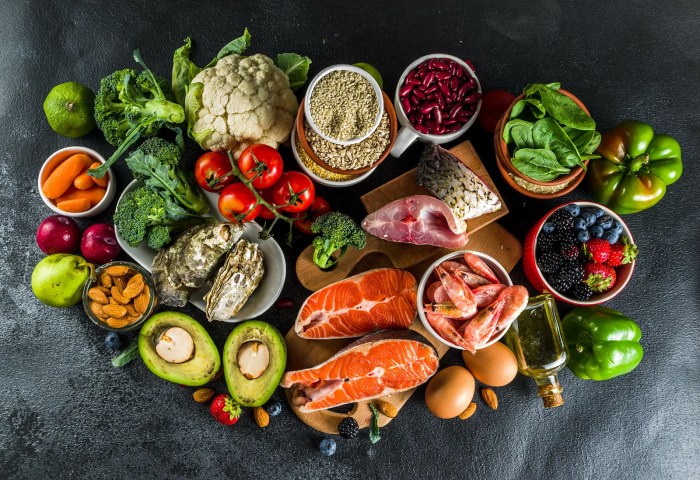Vegetarian or pescetarian? Delve into the realm of plant-based and seafood-inclusive diets, exploring their distinctions, nutritional implications, and far-reaching effects on health, environment, and society.
As we delve deeper, we’ll uncover the rationale behind these dietary choices, their impact on nutrient intake, and the potential health benefits and drawbacks associated with each.
Dietary Differences: Vegetarian vs. Pescetarian
Vegetarianism and pescetarianism are two distinct dietary patterns that share some similarities but also have notable differences. Both diets emphasize plant-based foods, but pescetarians additionally include fish and other seafood in their diet.
Foods Included and Excluded
- Vegetarian Diet:Includes fruits, vegetables, legumes, nuts, seeds, and grains. Excludes all meat, poultry, fish, seafood, eggs, and dairy products.
- Pescetarian Diet:Includes all vegetarian foods, plus fish, shellfish, and other seafood. Excludes meat, poultry, and eggs, but may include dairy products.
Rationale Behind the Dietary Choices
The motivations for adopting a vegetarian or pescetarian diet can vary. Some people choose these diets for ethical reasons, such as concerns about animal welfare or the environmental impact of meat production. Others may be motivated by health concerns, such as reducing the risk of chronic diseases like heart disease and cancer.
The ABC diet is a popular weight loss plan that follows a specific set of rules to achieve rapid weight loss. The diet involves alternating between periods of high protein and low carbohydrate intake, and vice versa. For a comprehensive guide to the abc diet rules , visit our website.
Nutritional Implications: Vegetarian Or Pescetarian

Vegetarian and pescetarian diets offer distinct nutritional profiles, each with its own potential benefits and drawbacks. Understanding these differences is crucial for ensuring adequate nutrient intake and overall health.
One of the primary differences between vegetarian and pescetarian diets lies in their protein sources. Vegetarians rely solely on plant-based proteins, while pescetarians incorporate fish and seafood into their diets. This difference has implications for the intake of essential amino acids, the building blocks of protein.
Protein Intake
- Vegetarians:May need to pay careful attention to ensure they consume enough protein from plant-based sources, such as legumes, tofu, and quinoa.
- Pescetarians:Have access to a wider range of protein sources, including fish, seafood, and plant-based foods, which can help them meet their protein needs more easily.
Another key difference between the two diets is their intake of omega-3 fatty acids. Omega-3s are essential fatty acids that play a vital role in heart health, brain function, and inflammation. While both vegetarians and pescetarians can obtain omega-3s from plant-based sources such as flaxseed and walnuts, pescetarians have the added advantage of consuming fish, which is a rich source of these fatty acids.
Omega-3 Fatty Acids
- Vegetarians:May need to supplement their diet with omega-3 fatty acid supplements or fortified foods to ensure adequate intake.
- Pescetarians:Can typically meet their omega-3 needs through regular consumption of fish and seafood.
Additionally, vegetarians may have a lower intake of certain vitamins and minerals, such as iron, vitamin B12, and calcium, which are commonly found in animal products. It is important for vegetarians to include fortified foods, supplements, or alternative sources of these nutrients in their diets.
If you’re looking for a quick and effective way to shed some pounds, the abc diet rules might be the perfect fit for you. This restrictive diet involves consuming only specific foods in a set order, and it’s said to promote rapid weight loss.
Micronutrient Intake
- Vegetarians:May need to be mindful of their intake of iron, vitamin B12, and calcium, and consider supplementation or consuming fortified foods.
- Pescetarians:Typically have higher intakes of these micronutrients due to the inclusion of fish and seafood in their diets.
Overall, both vegetarian and pescetarian diets can provide adequate nutrition with careful planning and attention to nutrient intake. Vegetarians should ensure they consume enough protein, omega-3 fatty acids, and essential vitamins and minerals from plant-based sources or supplements. Pescetarians, while having access to a wider range of nutrient sources, should still be mindful of their overall dietary intake to ensure they are meeting their nutritional needs.
Health Considerations

Vegetarian and pescetarian diets have been linked to various health benefits, including reduced risk of cardiovascular disease, cancer, and overall mortality. However, individual health outcomes within these dietary groups can be influenced by factors such as the specific foods consumed, overall dietary patterns, and individual lifestyle choices.
Cardiovascular Disease
Both vegetarian and pescetarian diets have been associated with a lower risk of cardiovascular disease. A meta-analysis of 12 studies found that vegetarians had a 24% lower risk of heart disease compared to non-vegetarians. Pescetarians have also been found to have a lower risk of heart disease, although the evidence is less conclusive than for vegetarians.
The protective effects of vegetarian and pescetarian diets against cardiovascular disease are likely due to several factors, including:
- Lower intake of saturated fat and cholesterol
- Higher intake of fruits, vegetables, and whole grains
- Higher intake of antioxidants
- Lower body weight
Cancer
Vegetarian and pescetarian diets have also been linked to a lower risk of cancer. A meta-analysis of 10 studies found that vegetarians had a 15% lower risk of cancer compared to non-vegetarians. Pescetarians have also been found to have a lower risk of cancer, although the evidence is less conclusive than for vegetarians.
The protective effects of vegetarian and pescetarian diets against cancer are likely due to several factors, including:
- Higher intake of fruits, vegetables, and whole grains
- Higher intake of antioxidants
- Lower intake of processed meats
Overall Mortality
Vegetarian and pescetarian diets have been linked to a lower risk of overall mortality. A meta-analysis of 16 studies found that vegetarians had a 12% lower risk of death from all causes compared to non-vegetarians. Pescetarians have also been found to have a lower risk of overall mortality, although the evidence is less conclusive than for vegetarians.
The protective effects of vegetarian and pescetarian diets against overall mortality are likely due to several factors, including:
- Lower risk of cardiovascular disease
- Lower risk of cancer
- Lower body weight
- Healthier lifestyle choices
Environmental Impact
Vegetarian and pescetarian diets have significant environmental implications, as food production practices can impact greenhouse gas emissions, water consumption, and land use. Understanding the environmental impact of these dietary choices is crucial for promoting sustainable food systems.
Greenhouse Gas Emissions, Vegetarian or pescetarian
Animal agriculture contributes significantly to greenhouse gas emissions, particularly methane and nitrous oxide. Vegetarian diets eliminate meat consumption, reducing these emissions. Pescetarian diets, while including fish, still have a lower carbon footprint compared to meat-based diets due to the lower environmental impact of fish production.
Water Consumption
Meat production requires substantial water resources, from livestock drinking to crop irrigation for feed. Vegetarian diets, with their focus on plant-based foods, require significantly less water compared to meat-based diets. Pescetarian diets, while having a higher water footprint than vegetarian diets due to fish consumption, still have a lower water footprint than meat-based diets.
Land Use
Animal agriculture requires extensive land for grazing and feed production. Vegetarian diets reduce land use by eliminating the need for livestock grazing and feed crops. Pescetarian diets, while requiring less land than meat-based diets, still have a higher land footprint compared to vegetarian diets due to the land required for fish farming.
Role of Dietary Choices
Dietary choices play a vital role in promoting environmental sustainability. By choosing plant-based foods over animal products, individuals can reduce their environmental footprint and contribute to a more sustainable food system. Vegetarian and pescetarian diets offer viable options for reducing greenhouse gas emissions, water consumption, and land use, while providing nutritional benefits.
Social and Cultural Aspects
The adoption of vegetarian and pescetarian diets is influenced by a complex interplay of social and cultural factors. These diets are not merely dietary choices but reflect deeply held beliefs, values, and social norms.
Ethical considerations, religious beliefs, and personal motivations play a significant role in shaping dietary choices. Many vegetarians and pescetarians cite animal welfare concerns as their primary motivation, believing that it is unethical to consume animals or animal products. Religious beliefs, such as Hinduism and Buddhism, also promote vegetarianism as a means of non-violence and compassion towards all living beings.
Societal Perceptions and Challenges
Vegetarian and pescetarian diets are often met with varying degrees of societal acceptance and understanding. While these diets are becoming increasingly popular, they can still face social stigma and skepticism. Some individuals may view these diets as restrictive, unhealthy, or impractical.
This can lead to social pressure and challenges, particularly in social settings where food plays a central role.
Additionally, the availability of vegetarian and pescetarian options in restaurants, supermarkets, and social gatherings can be limited, which can make it difficult for individuals to adhere to these diets consistently.
Final Conclusion

From ethical motivations to environmental concerns, the adoption of vegetarian or pescetarian diets is a multifaceted journey influenced by a myriad of factors. Understanding the nuances of these diets empowers individuals to make informed choices that align with their values and aspirations.
FAQ Explained
What are the key differences between vegetarian and pescetarian diets?
Vegetarian diets exclude all animal products, including meat, poultry, fish, seafood, eggs, and dairy, while pescetarian diets include seafood and fish but exclude other animal products.
Are vegetarian and pescetarian diets nutritionally adequate?
Both diets can provide adequate nutrition if planned carefully. Vegetarians need to ensure sufficient intake of protein, iron, vitamin B12, and calcium, while pescetarians need to be mindful of omega-3 fatty acid intake.
What are the potential health benefits of vegetarian and pescetarian diets?
These diets have been linked to a lower risk of heart disease, certain types of cancer, and type 2 diabetes.
How do vegetarian and pescetarian diets impact the environment?
These diets generally have a lower environmental impact compared to meat-based diets, as they require less land, water, and energy to produce.